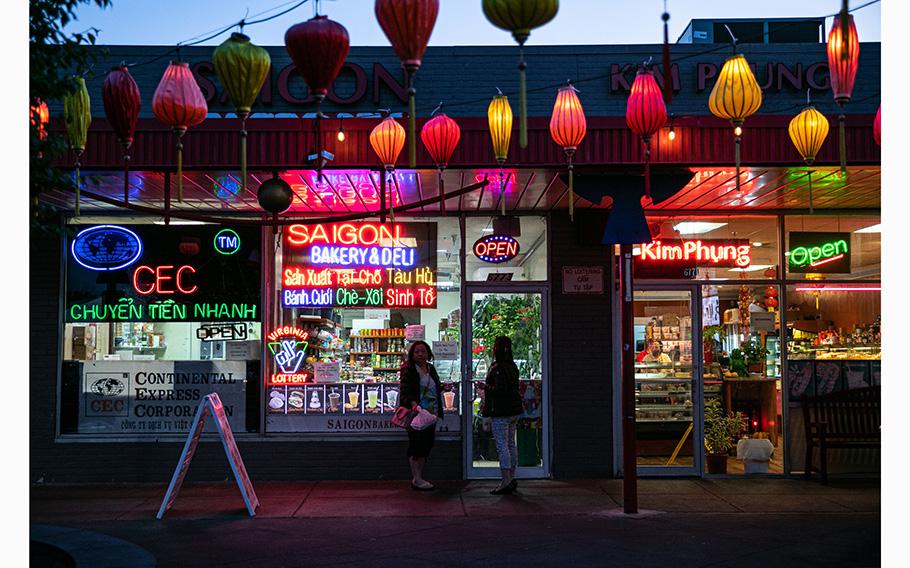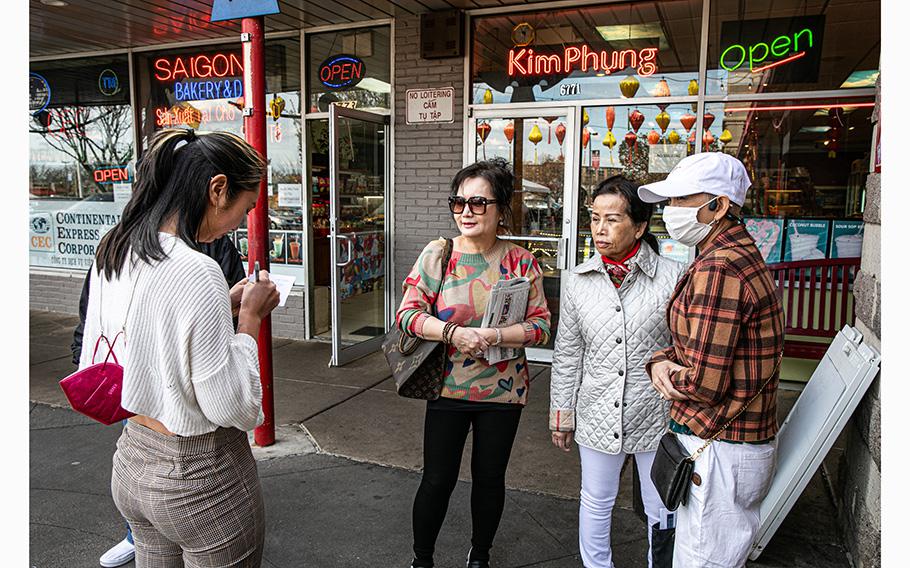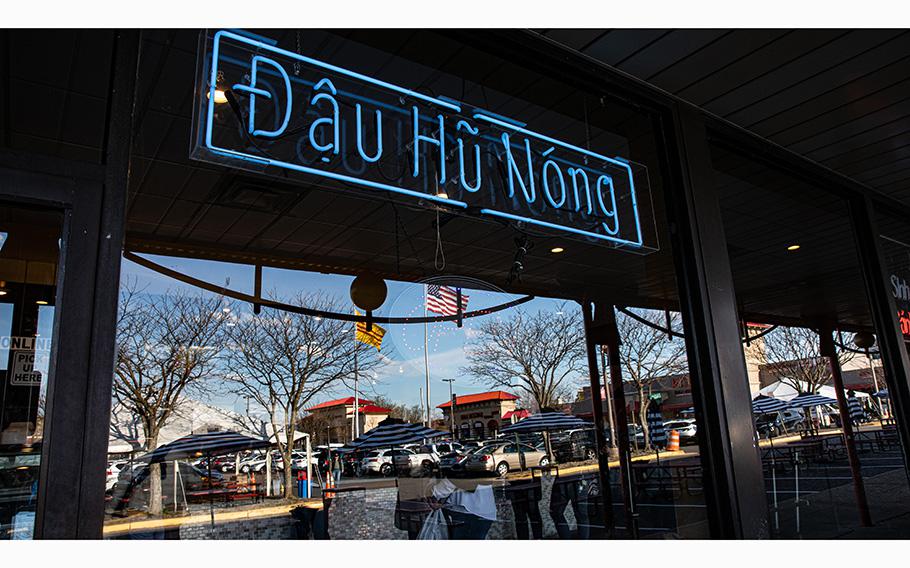
Eden Center in Falls Church, Va.,as seen on April 25, 2023, contains the East Coast’s largest concentration of Vietnamese businesses. (Valerie Plesch for The Washington Post )
By the time Jenn Tran approached the counters, overflowing with vessels of hand-wrapped pork products, the rumors about Eden Center's demise had already been extinguished.
Local government officials were not about to redevelop this aging Northern Virginia strip mall, a maze of neon and asphalt that contains the East Coast's largest concentration of Vietnamese businesses. The city was only drafting a possible blueprint on how it might be enhanced.
Yet Tran, 26, still wanted to know if the two middle-aged women who own Cha Lua Ngoc Hung - one of dozens squeezed into the massive shopping plaza a few miles outside D.C. - had thought about where they fit in Eden Center's future.
"The landlord has already talked to us and said there's nothing to it," the woman said in Vietnamese of the redevelopment rumors. "If they were going to do anything, they would have to tell us."
Her sister, finishing a transaction at the register, shot back with a question of her own: "Why are you coming in here and talking about this now?"
For Tran, who grew up a few miles away, the answer was simple: She wanted to make sure this lifeline to her family's heritage - a beating heart for the region's Vietnamese American community - would stick around.
As rent prices and new buildings have kept rising nearby, she and a group of young Vietnamese Americans have been lobbying Falls Church city officials for an ambitious, multipronged strategy to prevent small businesses from one day being pushed out - and tried to get the shopkeepers to join their fight.
"There's still a possibility of displacement with this plan," Tran said earlier this spring, sitting at one of the red metal tables tucked away from Eden Center's gargantuan parking lot. "Maybe you can sign a 30-year lease, but that doesn't mean you can afford a 30-year lease. Any change in the ecosystem could be really disastrous."
But as she and others in the Viet Place Collective (VPC) have pushed that message this spring, writing letters to government officials, hosting tours of the plaza and going shop to shop themselves, they have at times struggled to gain traction from older generations, both within and outside the mall.
Some of the business owners have responded with skepticism. Falls Church City Council members, who are set to vote on a plan Monday, say many VPC demands go beyond the scope of local government. And the mall's owner, a Florida-based real estate company, has shrugged off their concerns entirely.
"We share the same passions. We love Eden Center. We want it to be there forever," said Alan Frank, a senior vice president at Capital Commercial Properties, which owns the property. "I don't want to pick on them," he said of Tran's group, "but I think they're kind of getting all worked up over nothing."
To the young activists, though, that is, in some sense, the point. They worry that if city planners don't do more now, Eden Center will go the way of so many other dwindling Asian immigrant cultural districts across the country.
In Los Angeles's Chinatown, longtime merchants have closed after new landlords bought up properties and rented them to luxury stores. Residents in Philadelphia's Chinatown, whose Asian population has been steadily decreasing, fear plans to erect a new basketball stadium could accelerate that decline. And here in Northern Virginia, displacement is all too familiar for the local Vietnamese community: A vibrant shopping district that once existed in nearby Arlington County was effectively priced out with the arrival of the Metro.
"We settled where we are now because it was affordable. It was less desirable at the time," said Jess Nguyen, 23, another VPC organizer. "And now that we've enriched these areas, the people in power want to turn the tables on us."
The past
The Eden Center that Tran and Nguyen grew up visiting to eat pandan waffles and stock up on tropical fruit was part planning, part refuge.

Jamie-Claire Chau, one of the organizers of Viet Place Collective at Eden Center, in Falls Church, Va., speaks March 29, 2023, with members of the local Vietnamese community. (Valerie Plesch for The Washington Post )
In the 1970s, Vietnamese refugees fleeing the fall of Saigon concentrated in Arlington's Clarendon neighborhood, where they found low rents in aging buildings next to construction on a future Metro line. So many businesses flocked to a three-block stretch that it came to be known as "Little Saigon."
"When I came here, the place was almost dead and no one wanted it," Giang Huu Tuyen, founder of a Vietnamese-language newspaper, told The Washington Post in 1989. "But over the years, the Vietnamese people made this a lively community."
Once the Metro started running, though, developers and county officials pushed ambitious plans to turn the area into an "urban village." Steep rent hikes and an end to many short-term leases led many small business owners in Little Saigon to relocate to an aging supermarket 3 1/2 miles away, where some Vietnamese real estate companies were seeking to create a new district for the shopkeepers.
Today, Eden Center in Falls Church is home to 115 shops, nearly all Asian and most Vietnamese, where shoppers can shoot billiards in smoky backrooms, stock up on fresh herbs or buy fried tofu by the pound.
It's become a draw for tourists and a popular destination for many of the 80,000 Vietnamese Americans in the Washington region, to the point that the sprawling space can sometimes feel cramped: On a weekend morning, it can take more than an hour to find parking.
City planners in Falls Church, a wealthy, suburban city of about 15,000, had hoped to tackle the infrastructure issues at Eden Center when they first put together a blueprint for the site and surrounding area two years ago.
The East End Small Area Plan, like similar documents for six other business districts, is meant to help them negotiate with developers if and when they propose new projects in this rapidly growing slice of the D.C. suburbs. It can also prompt zoning changes that might allow for the projects.
But as the city launched this effort, rumors that spread from shop to shop were much more ominous: The redevelopment that pushed them out of Arlington was about to be repeated in Falls Church.
Letty Hardi, the city's vice mayor, said the problem was simply a poor choice of words.
"We were not careful in the beginning and used the word 'redevelopment,'" she said. "There are no imminent bulldozers. It's always been about reinvestment. [But] that was an unfortunate use of language that I think cascaded some of the fears."
Initial outreach on the plan didn't help, either. As most of the small businesses at Eden Center were busy catering to the Saturday morning rush, the planners gathered a group of people at a church more than a mile away for a meeting conducted in English.
Nguyen, Tran and a few other millennials in attendance said their community was excluded from the process. So even though none had family who owned shops or worked at Eden Center, they decided to get involved directly.
They distributed fliers in English and Vietnamese with an "urgent call to action," and began a campaign to urge other Vietnamese Americans to speak before the city council or record testimonies of their grandparents. On Instagram, they mapped out potential zoning changes and charged that the city was "planning for retail + residential high-rise development."
And as the city hit pause due to their efforts and vowed to revisit the plan, the newly formed group kicked off its own effort to reach out to business owners.
The business owners
Members of VPC could bridge the language gap well enough with store owners, sometimes with the help of their parents. But often, time wasn't on their side. While most tenants were grateful for their spirit, some pondered the possibilities and visions for development that they simply wouldn't be around for.

Eden Center in Falls Church, Va., seen March 29, 2023, is home to 115 shops, nearly all Asian and most of them Vietnamese, such as this popular tofu shop. (Valerie Plesch for The Washington Post )
"I have an arrangement to pass the store along to my niece soon," said Suong Nguyen, owner of Bánh Cuon Saigon, a gold-walled dining room specializing in savory, steamed rolled rice crepes, tucked near the rear entrance.
She understands whatever changes may come could come well after she steps aside. But Suong Nguyen has been one of VPC's most vocal allies among business owners, making personal pitches to skeptical shopkeepers around the plaza.
"I might be here another four years until my kids get out of college. I'm tired," said Trâm Mai, owner of Saigon Restaurant, a carryout whose hot bar of ready-to-eat entrees greet visitors on the opposite end of the mall. "I'm tired just standing here talking."
Mai has run the eatery for 24 years and said she has always had a good relationship with the landlord. She has adapted plenty during that time to busier foot traffic and shrinking parking. Whatever plan the city or Eden Center owners had to develop, she said, they could go right ahead.
Shopkeepers are just now getting comfortable talking with each other about how they can work more cooperatively. But it's still hard for some to feel as if there's a unifying bond to the shopping center beyond being Vietnamese immigrants and, for some, years of distrust with the landlord and the city.
"It's hard for a lot of them to think about 10 years in the future when their current state is not secure," said Tran, the VPC outreach coordinator. "People here are battling very present problems."
Owners cited issues such as the lack of parking for customers on weekends as community events clogged up the lot, driving down business from loyal customers. Suong Nguyen was one of more than a dozen tenants who sued Eden Center's owners in 2012, alleging their landlord ignored water, trash and sewage problems and took advantage of tenants. Some merchants recall a 2011 police raid of some businesses on suspicions of gang and gambling activity.
But for some business owners, VPC's attention to Eden Center gives them hope.
"As soon as I talked with them," Suong Nguyen said, "I'm happy now to know that the second generation [of Vietnamese Americans] will understand the Vietnamese community and are ready and willing to help."
The city planners
On a weekday afternoon this spring, three city planners for Falls Church set up a table under Eden Center's clock tower - modeled after one at Saigon's oldest market - with a big easel that asked passersby to share their thoughts about the site's future.
One of them, Cameron Gahres, meandered door-to-door and launched into the same short monologue before the puzzled owner of each business: a noodle shop, a cellphone store and a travel agency.
He was here to learn more about Eden Center, he told them. Nothing was up for redevelopment. Nothing was going to change. "But in the future," he repeated, "we're just talking of ways we could possibly improve."
That line underscores the approach from city planners as they fine-tune details. The plan is a wish list, they say, a chance to write down the current and future wants of the community.
"This is a very piecemeal type of procedure, where you're doing little changes to slowly build towards this ultimate vision," Gahres said.
After VPC sent the city a list of demands, Gahres and his colleagues incorporated some of their asks into a new draft, which is still pending approval: It would rename the neighborhood as Little Saigon East, change the name of a major thoroughfare from Wilson Boulevard to "Saigon Boulevard," and put up bilingual, branded banners around the site.
They also added a "tool kit" of possible steps to curb displacement, also adapted from VPC's demands: A special tax district, for instance, could reinvest tax revenue collected at Eden Center into legal assistance or grants for longtime business owners.
But missing from the new draft was a concrete list of steps to implement those strategies - which city officials say may fall outside their authority.
"I would be fearful of creating expectations that we're not able to live up to or shouldn't as a matter of law or finance," Falls Church City Council member David Snyder said.
Still, VPC members say it's a matter of urgency amid a changing real estate market.
The group said some Vietnamese restaurants at Eden Center have willingly relocated to less expensive, better-run properties elsewhere. They claim shops on-site are paying nearly three times as much as stores in nearby strip malls and have been pressured by the landlord against sharing their rent costs with each other - a charge the company denies.
"The status quo is not advantageous to these Vietnamese businesses," Nguyen said. "Simply put, if things continue to be business as usual, the place is going to fall apart."
The political debate
As the Falls Church City Council dug into the blueprint during a meeting late last month, a representative for Eden Center's owner spoke against many of VPC's suggestions.
Frank, a real estate executive at Capital Commercial Properties, said that narrowing a nearby street might damage the shopping plaza. Renaming the whole area to "Little Saigon East" - an idea that has been eliminated from the most recent draft - would counteract the branding work already done by his company. And any sort of anti-displacement measures seemed to be singling out his firm.
"We have to be treated like any other business in the city," he testified before the council. "If tenant displacement is something that this council would like to discuss and pass an ordinance, then fine, we'll participate in that process. But that doesn't belong in this plan."
Hardi, the vice mayor, said she understands the pressures VPC is trying to address: Her own family immigrated from China and later owned several Chinese restaurants in Northern Virginia.
"The motivation behind them is all positive," she said. "How do we get creative and support these small businesses in a way that is more meaningful than a policy in a book that sits on a shelf?"
But many of the biggest concerns she has heard are ones that ultimately fall outside the city's purview: Any changes to on-site parking fall to the business owner. Lease negotiations are not part of legislating for the city. And changing the area's name might need to stem from a whole new process.
"We can't butt in and say, 'Hey, you should pay lower rent, or you should do XYZ,'" Hardi said in an interview. "It is a private tenant-landlord relationship."
VPC members have pointed to D.C.'s Chinatown - or what's left of it - as an example of what could happen to Eden Center if city officials do not meet their demands. Just like the area near Capital One Arena, they say this strip mall also stands to lose the small businesses that make it stand out.
"It really feels like walking through a Vietnamese neighborhood," Tran said. "There's people selling fruit and there's yelling and karaoke and so much life that wouldn't exist if it were just a handful of stores."
As she looked around, she began recalling a recent visit with her mom. As the sun was setting over the clock tower, the whole plaza began to darken. Neon signs in store windows flickered on.
Tran's mother has not been back to Vietnam for more than a decade. But that sight, she told her daughter, reminded her of being home.